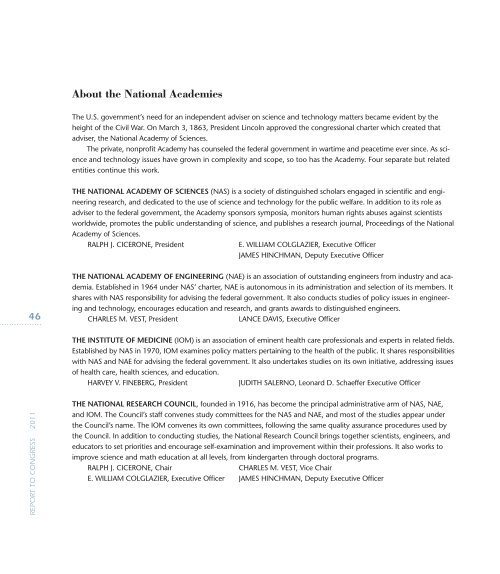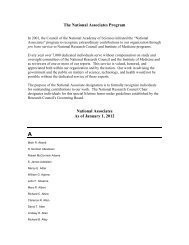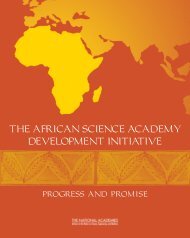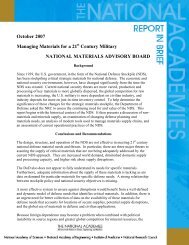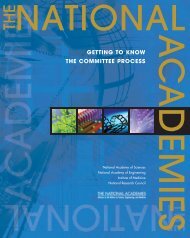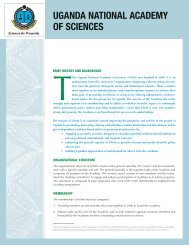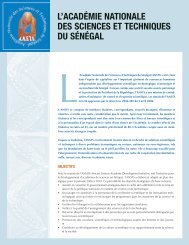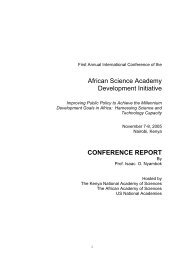Report to Congress 2011 - National Academies
Report to Congress 2011 - National Academies
Report to Congress 2011 - National Academies
You also want an ePaper? Increase the reach of your titles
YUMPU automatically turns print PDFs into web optimized ePapers that Google loves.
About the <strong>National</strong> <strong>Academies</strong><br />
The U.S. government’s need for an independent adviser on science and technology matters became evident by the<br />
height of the Civil War. On March 3, 1863, President Lincoln approved the congressional charter which created that<br />
adviser, the <strong>National</strong> Academy of Sciences.<br />
The private, nonprofit Academy has counseled the federal government in wartime and peacetime ever since. As science<br />
and technology issues have grown in complexity and scope, so <strong>to</strong>o has the Academy. Four separate but related<br />
entities continue this work.<br />
THE NATIONAL ACADEMY OF SCIENCES (NAS) is a society of distinguished scholars engaged in scientific and engineering<br />
research, and dedicated <strong>to</strong> the use of science and technology for the public welfare. In addition <strong>to</strong> its role as<br />
adviser <strong>to</strong> the federal government, the Academy sponsors symposia, moni<strong>to</strong>rs human rights abuses against scientists<br />
worldwide, promotes the public understanding of science, and publishes a research journal, Proceedings of the <strong>National</strong><br />
Academy of Sciences.<br />
RALPH J. CICERONE, President<br />
E. WILLIAM COLGLAZIER, Executive Officer<br />
JAMES HINCHMAN, Deputy Executive Officer<br />
46<br />
THE NATIONAL ACADEMY OF ENGINEERING (NAE) is an association of outstanding engineers from industry and academia.<br />
Established in 1964 under NAS’ charter, NAE is au<strong>to</strong>nomous in its administration and selection of its members. It<br />
shares with NAS responsibility for advising the federal government. It also conducts studies of policy issues in engineering<br />
and technology, encourages education and research, and grants awards <strong>to</strong> distinguished engineers.<br />
CHARLES M. VEST, President<br />
LANCE DAVIS, Executive Officer<br />
THE INSTITUTE OF MEDICINE (IOM) is an association of eminent health care professionals and experts in related fields.<br />
Established by NAS in 1970, IOM examines policy matters pertaining <strong>to</strong> the health of the public. It shares responsibilities<br />
with NAS and NAE for advising the federal government. It also undertakes studies on its own initiative, addressing issues<br />
of health care, health sciences, and education.<br />
HARVEY V. FINEBERG, President<br />
JUDITH SALERNO, Leonard D. Schaeffer Executive Officer<br />
REPORT TO CONGRESS <strong>2011</strong><br />
THE NATIONAL RESEARCH COUNCIL, founded in 1916, has become the principal administrative arm of NAS, NAE,<br />
and IOM. The Council’s staff convenes study committees for the NAS and NAE, and most of the studies appear under<br />
the Council’s name. The IOM convenes its own committees, following the same quality assurance procedures used by<br />
the Council. In addition <strong>to</strong> conducting studies, the <strong>National</strong> Research Council brings <strong>to</strong>gether scientists, engineers, and<br />
educa<strong>to</strong>rs <strong>to</strong> set priorities and encourage self-examination and improvement within their professions. It also works <strong>to</strong><br />
improve science and math education at all levels, from kindergarten through doc<strong>to</strong>ral programs.<br />
RALPH J. CICERONE, Chair<br />
CHARLES M. VEST, Vice Chair<br />
E. WILLIAM COLGLAZIER, Executive Officer JAMES HINCHMAN, Deputy Executive Officer


